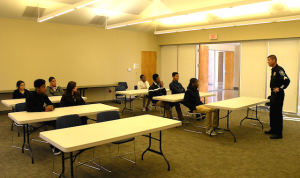Collinsville High School teacher Barbara Lindauer asked a simple question while watching the violent protests that unfolded in Ferguson, Mo., following the shooting death of Michael Brown in August, “could something like that happen in our community?”

Sargent Wayne White of the Glen Carbon Police addresses a group of Collinsville High School students interested in a career in law enforcement / photo by Roger Starkey
The Ferguson riots were partly blamed on a deep distrust between American minorities and American police officers, who are overwhelmingly white. The New Republic reported that a 2007 Department of Justice survey showed 75 percent of police officers in the United States were white and 12 percent African-American.
The smaller the city or town, the higher percentage of the police force was white. According to United States Census Bureau, 63 percent of Americans are white alone.
Many police agencies across the nation say the reason for the disparity between whites and African-Americans in police agencies is the lack of applicants. Collinsville has no African-American officers and only two Hispanics, but City Manager Scott Williams, a former Collinsville chief of police, has said it is not for lack of effort.
When a Collinsville Police Department position becomes available, a concerted effort is made to advertise to the minority population throughout the St. Louis area, Williams said. Still, few minorities apply.
Lindauer knew several of her students were interested in law enforcement and wanted to foster that interest, which is why she arranged visits Friday with the Collinsville, Glen Carbon and Illinois State police departments.
“I want them to know that the police are not the bad guys, they are just regular people” Lindauer said. “I wanted to promote trust between them (the minority students) and the police.”
During the visit to the Glen Carbon Police Department, Sargent Wayne White talked about the every day life of a police officer, what the students can expect if they choose a career behind the badge. He stressed to the CHS students that he and other officers are regular people with regular lives, who happen to have a job as police officers. White also answered the students’ questions about the best way to start a career in law enforcement.
The first recommendation from White was to get a college degree.
“The era of not going through higher education, and going into law enforcement, is over,” White said.
When he was hired 18 years ago, he was one of two Glen Carbon officers with a four-year degree, White said. Of the most recent six officers hired by his department, only one did not have a bachelor’s degree.
The military, which used to be the training ground for police officers, is still a good option for those interested in becoming a police officer, White said.
“The military will provide opportunities to pay for college, and will give you preference points when you apply for a job as a police officer,” White said.
Contrary to the Hollywood image of police work, he primarily spends his days resolving minor issues, White said. Communication skills are, therefore, extremely important.
Minorities and women have different experiences in life than white males, which allows them to communicate differently, White said. The ability to see situations from a different perspective makes having minority groups on a police force very desirable.
“Things you guys do and say in your house I will never understand; and the same for you with things that happen in my house,” White said to the group of seven minority students. “People are shaped by what they are exposed to.”
CHS student Corey Walker said a belief that they will not be hired discourages African-Americans from attempting to be police officers. Seeing mostly white officers reinforces that belief, Walker, an African-American, said.
Fellow student Jordan Smith said many people he knows are not interested in law enforcement because they are more interested in higher paying jobs, believing they will one day be rich.
“I want a job that isn’t always the same,” Smith said.
Student Max Lyons said many people in Collinsville think of the police as the enemy. As the group departed for a visit to the Illinois State Police Department, it was clear they did not view the police as the enemy. Each of them said they were still interested in a career in law enforcement, interested in giving back to their community.



